Even the obvious benefits of great customer reviews are almost too many to count. To wit:
- They take a little pressure off your site to “convert,” because visitors arrive largely pre-sold.
- They can help you eat up more of page one of Google.
- They help you cultivate non-Google Maps or non-Google sources of visibility.
- They take some of the pressure off your local SEO and other online-marketing efforts, because they build your reputation online and offline.
- You’ll be a little more attuned to customer-service if you know you’ll ask for a review eventually.
- Even if your rankings stink, they help you land more word-of-mouth referrals. (Those people probably Google you, too.)
- Whoever sees your reviews in the local search results is more likely to pick up the phone.
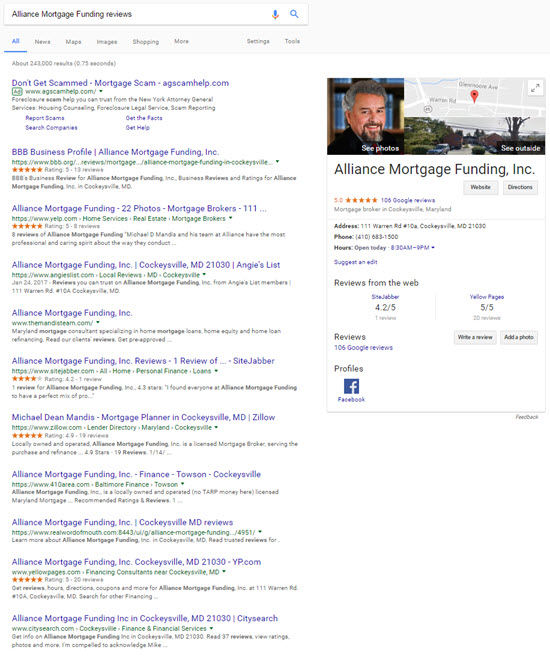
Those are just the beginning, though. You can squeeze many other benefits from customers’ reviews and from the process of earning and encouraging them. As AJ Kohn said about commenting on blog posts, the hidden power of reviews is ridiculous.
Here are some of the less-obvious ways you can use your reviews to help your local SEO and marketing even more.
1. Use them to research keywords. You might not call your services what your customers call them, and you might not search for them in the way they search for them. Where appropriate, try to incorporate those phrases into relevant pages of your site, or create separate pages on them.

2. Mine your reviews to learn exactly what kinds of customers have reviewed you, and why. Use those insights to determine who are the other customers most likely to review you (and ask them), and to make your services better.
3. Study your competitors’ reviews. Ask the same questions as in points #1-2.
4. Use a freshly-written review as an excuse to contact the customer who wrote it. Say thanks. Ask how he or she is doing, or just say you’d like any further feedback. That’s good to do on principle, and sometimes you’ll get repeat business out of the deal.
5. Use a new review as an occasion ask for an additional review, on a different site, if the customer is willing.
6. Write owner-responses in a way that makes you look great to anyone reading your reviews.
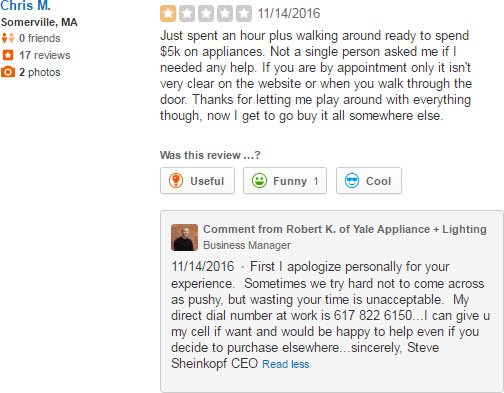
7. Copy and paste the reviews onto your site. (Google doesn’t seem to mind, and neither does Yelp, and other sites surely don’t care.) I suppose this isn’t such a hidden benefit of reviews, but I have to mention it because it’s so important. Your customers’ reviews are copywriting rebar. Your selling points are stronger if you’re not the only one touting them. Also, if you cite the city the reviewer is from, they’re semi-“local” content you don’t have to write. They’re particularly useful on city pages.
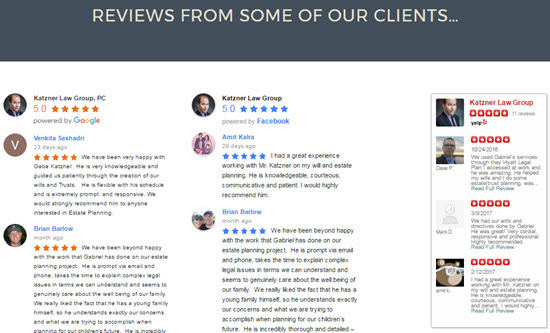
8. Put them on a “Reviews” or “Reviews & Testimonials” page on your site. It might even rank for keyword + reviews local search terms.
9. Use them on a “Why Choose Us?” page.
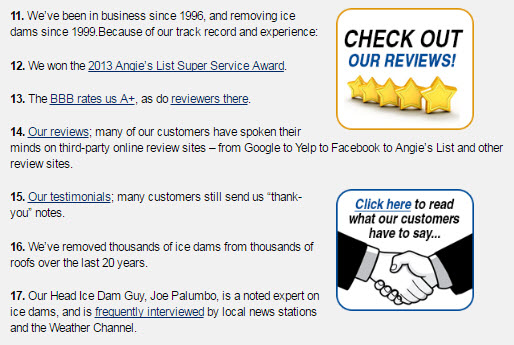
10. Add reviews badges or widgets to your site to showcase the reviews. The badges serve as third-party “trust” symbols, if you use the badge(s) provided by the site where you’ve got the reviews.
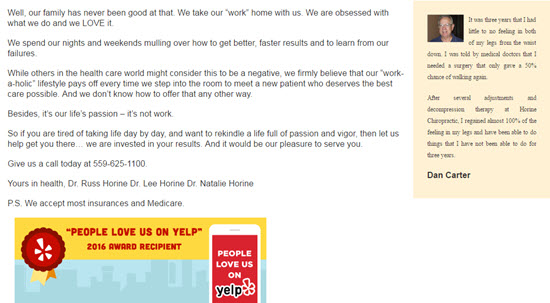
11. Create your own badge, if none is available on the site where you’ve got a pile of good reviews.
12. Allude to your reviews in your AdWords ads.
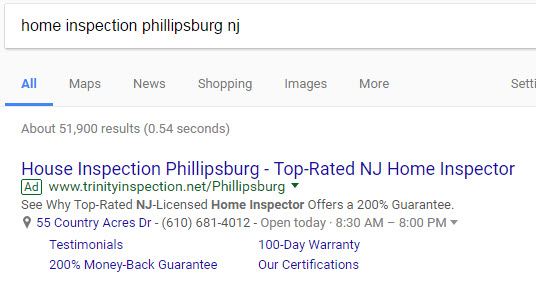
13. Include them (or excerpt or link to them) in your email signature, possibly along with a link to your “Review Us” page.
14. Use them as seeds for blog post topics. You can expand on certain selling points (or other points) a reviewer brought up.

15. Use them to reduce surprises and customer-service issues, by encouraging visitors to read your reviews before they call you. Even if that means they have to open up another browser tab and take their eyes off your site for a minute. Say something like, “We want you to know how we made other customers happy, and we want you to be our latest happy customer, so please take a minute to read our reviews.” When they come back, they’ll be more likely to call you, and less likely to eat up your time with questions your past customers already answered.
—
Any non-obvious powers of reviews I didn’t mention?
How do you leverage your reviews (the good and even the bad)?
Any great real-life examples of one of the points I mentioned?
Leave a comment!

Phil this is very helpful. I’d love to see info on how negative reviews can damage your SEO. I’ve heard for every 1 negative review a business needs at least 10 positive reviews to erase the damage. I’m not sure how true that is. What are your thoughts?
Hey Daniel,
I wouldn’t say negative reviews directly harm your SEO. Aside from the obvious harm to your ability to make rain, I’d say the only implications for your SEO are that you’ll get lower click-through from the search results, and if it keeps up Google likely will hold that against you.
The question of good reviews and bad reviews outweighing each other is a great one, and complicated. For one thing, it depends on the credibility of the bad reviews and the good. It depends on whether the bad review is more credible than the 10 good ones. Let’s say you have 20 5-star reviews that aren’t too detailed and seem generic, but you have ONE 1-star review that is very detailed and that calls into question the credibility of the good ones. At that point, more good reviews of the same kind can’t balance out that bad one. They’re not made of the right stuff.
On the other hand, if all the good reviews seem credible, but the bad review is from a whiny or questionable reviewer, then the bad review may make you look even better.
I can offer personal validation for what Phil says in this invaluable post. My site ranks very high on Google because I am the ONLY resume writer in the NYC area with 50 reviews on my Google Plus page. (I could get more, but I get so much business, I don’t always followup to ask for them! I use Phil’s handy template “Please leave a review for….” and that’s how I got so many – Phil distilled the steps down to eas-to-follow steps with screen shots.
Just be aware that Yelp will hide reviews from people who aren’t frequent Yelpers – they seem to think those people write paid reviews. It’s totally unfair, but nothing to do about it. I prefer Google reviews, anyway.
It sure can be an upward spiral, Lynda.
All good – thanks Phil 🙂
🙂
Good stuff! I think the word of mouth aspect is very powerful. My wife and I moved to Austin TX a while back and we didn’t have any friends or family there. So how did we find businesses to use? We read their reviews and then made a decision. We did this with restaurants, mechanics and even doctors.
Yessir – reviews matter from the get-go. I would guess the businesses with no or bad reviews didn’t even make your shortlist when you moved into town.
I wouuld also be very interested to know how a single negative review can impact your SEO. Any research or insight on that would be appreciated!
Not much. Please check out my reply to Daniel.
Phil, Thanks for the tips and ideas about how to leverage reviews. Have you found a great resource to reach out to customers and ask for reviews? We’ve worked with LightPost, BirdEye, and others, and are always interested to hear about the expiences of others.
Hey Craig,
When and how best to use an outreach tool are two tricky questions. (I plan to write about it.) Some are lousy and none is a complete solution. The good ones take finesse to use effectively. Anyway, without knowing a thing about your situation, I’d recommend trying GetFiveStars. Couple tips:
(1) Don’t bother if you have relatively few customers (in which case one-at-a-time emails are best)
(2) Try to ask in-person first, so the email doesn’t come out of the blue
(3) Disable the “feedback” feature in GetFiveStars. It asks customers to write a testimonial, before asking them for a review on a third-party site. It confuses or frustrates people. In a perfect world it would be off by default, but the good news is you can easily flick it off.
Phil – this blog post is so good, it’s ridiculous! 🙂
All these tips are great. My favorites are seeing reviews as a keyword research source and as a subject for blog posts. Oh, yes!
Thanks, Miriam!
I see that facebook is showing up in google search for reviews as well, which is good for us since we sell nationally and a lot of review sites like to focus on your local location. Always good to read about new and old ideas. Thanks!
Thanks Phil, As always amazing post on getting reviews. This is just what I needed.
Phil, I love you, man. No, I mean it I really love you. Dig the Wayne’s World clip. As usual, great local info and tips from you. Thanks. (Okay, maybe I just like you a lot.)
Heh – thanks!
[Awkwardly waves Garth over]
I always have such a difficult time sending a client to the “Review link” for my Google local page. In my industry, the clients seem to be computer-illiterate (harsh term) and have no idea where to go, what to look for, where to click. Google does not exactly makes it easy. Then if you create a badge on your site like you suggested, the url for a google review appears different for those who are signed in than for those who are not/don’t have a gmail, etc… Am I the only one with this never ending dilema?
You’re not alone in having that problem, but it’s also not usually too hard to fix:
1. Give those customers choices as to review sites. Most sites are simpler than Google to write a review on. I’d also offer Facebook and BBB as “backup,” easier options.
2. Don’t always provide a direct link. Don’t provide a plus.google.com link at all, because those don’t work anymore. Rather, give some simple “turn-by-turn” directions. Like the ones in the example about a 7th of the way down this page.
Thank you.
Hi Nick,
There is also this Google Review Generator by Whitespark that may help. You can print it out and hand it to clients and it walks them through each step: https://whitespark.ca/review-handout-generator/